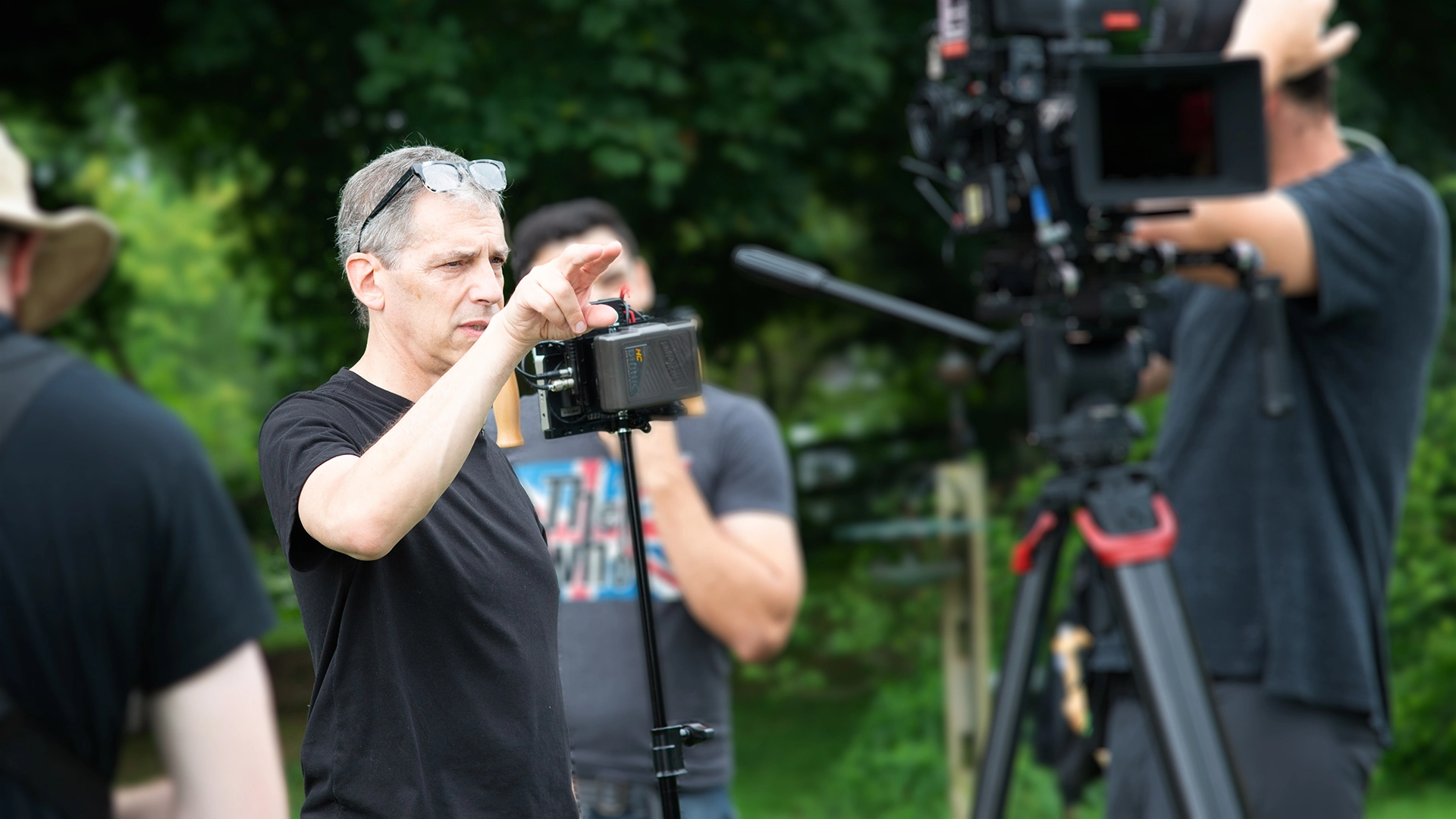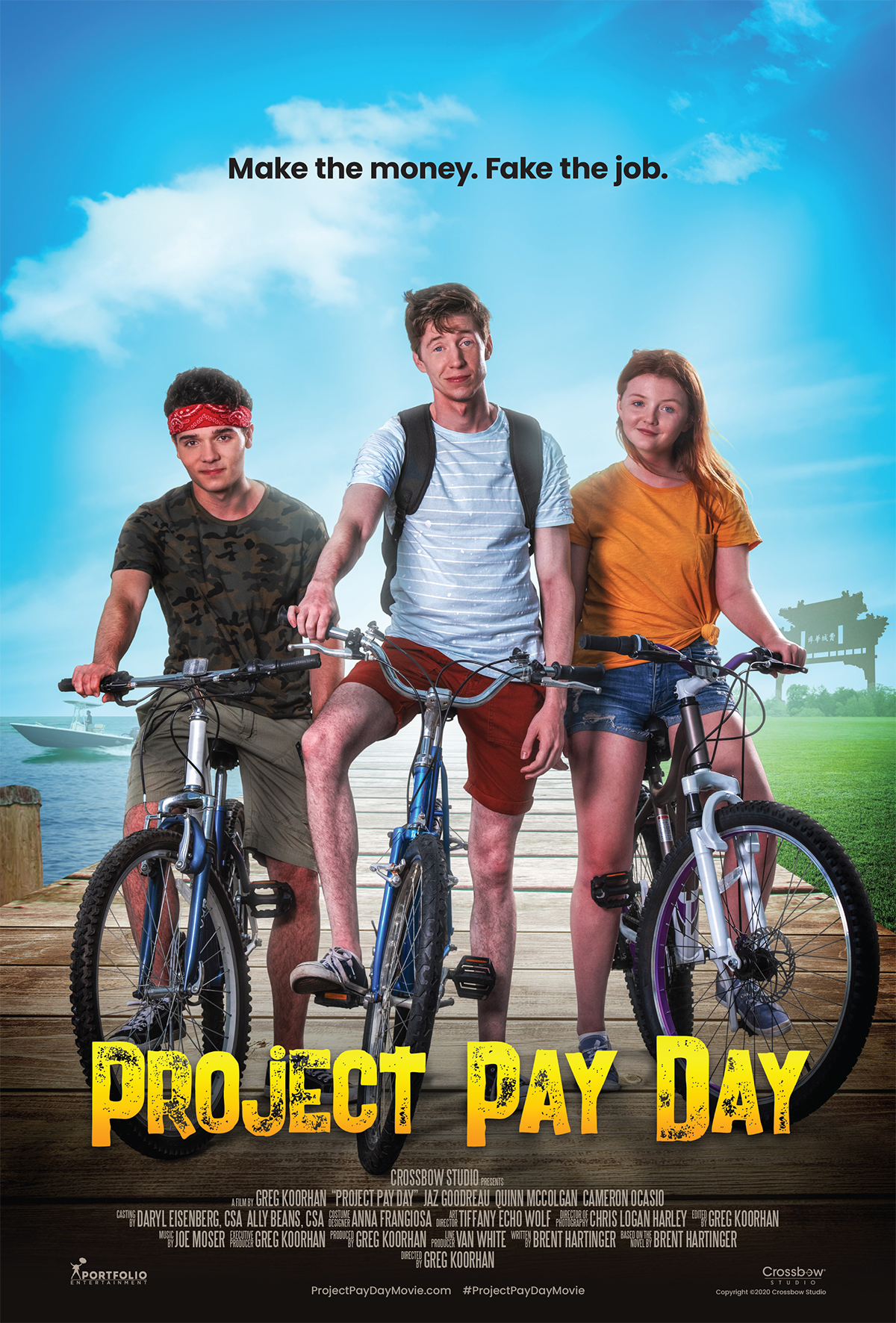
Greg Koorhan could be described as a renaissance man. He’s a marketer, author, host, entrepreneur, and with the release of Project Pay Day in 2021, a feature film director. Greg’s journey into the film industry is a unique one that came after working in marketing and brand-building for 30+ years. Now, Greg spends his time helping independent filmmakers connect with profitable audiences while continuing to direct and produce original films whenever he has the time. We have interviewed Greg to learn more about his experience directing Project Pay Day along with the several short films he’s made over the years.
The following interview has been edited for clarity and length.
1. We officially have three of your films on our platform (Level Up, Give Me a Sign, and Following Chase). Two that you wrote/directed and one that you only directed. How does the experience differ when directing a film you wrote vs a film someone else wrote?
Greg: Being the writer and director can give you a few shortcuts because you start interpreting the written word almost immediately. You can ‘see’ it in your mind’s eye as soon as you write it.
But I’ve found that collaborating with another writer opens up the possibility to bring a film to a level you just cannot achieve alone. Of course, everyone has to be able and willing to put their egos aside in service of the story. When that happens, I find the process very exciting.
Because you share a mutual respect with that person, so you can call each other out if you see inconsistencies, or question if there is a better motivation for a particular action. In other words, you can’t be lazy, haha. And you also have a separate set of eyes that can see opportunities to add subtext and meaning to a scene in ways you may not have noticed if it’s just you staring at the page.
Once on set and the camera rolls, however, it still falls on you to interpret that script and bring it alive. So you need to know the story inside and out, whether you drafted it originally or not.
2. What were the biggest challenges to directing these three short films?
Greg: Overall, time and money! That always seems to be the challenge, but on short films especially so, right?
During the shooting of Following Chase, for instance, which takes place entirely outside, we had an unexpected rainstorm when we first started shooting, essentially wiping out an entire production day. We only had the location for a limited time, so we had to get creative to make up some scenes.
We also had to pay close attention to things that could have easily eaten away the already tiny budgets – like organizing the number of locations used in Level Up. Or feeding all the background extras. We made a lot of sandwiches for the lunchroom scenes on that shoot. 😉

3. How did you get into filmmaking and specifically directing?
Greg: Had I listened to my inner intuition as a child, I probably would have gotten into filmmaking much sooner. I remember getting my hands on my dad’s 8mm camera when I was a teen, and I entertained myself for hours shooting and cutting together (in retrospect, probably pretty poor) short films.
But it wasn’t until much later in my career, when I had started my own production company – we were producing marketing films for corporate clients at the time – that I started to direct small passion projects on the side.
And as soon as I noticed the depth of connection with an audience that I could create with an original film, that’s when I was hooked.
Moving into directing was more straightforward in a way. Because every role I had in the corporate side of my career required some blend of creative and team direction.
So it really was a case of multiple yet only slightly related paths converging that gave me the experiences I needed to feel confident enough to put myself out there and direct a film.
4. Your films are all family-oriented and lighthearted. What draws you to this genre over others?
Greg: I guess it’s just the way I look at the world. I’m a dreamer, always have been, and I love to laugh. It’s not that I don’t enjoy a good drama, or a tense thriller – actually, directing a heist film has always been on my bucket list – but I naturally gravitate to stories that leave a smile on your face. And particularly these days, I think we need more stories that show how beautiful the world can be when we are kind to one another.
5. Bringing a film to life takes a lot of hard work but also skill. What vital lessons have you learned that were instrumental in your journey as a director?
Greg: That is so true, there are so many facets and areas to grow as a director. I don’t think the journey is ever over. But, besides being a lifelong student of storytelling and the language of film, there are a few vital things I’ve learned so far (mostly the hard way) that I know increase your chances of success:
Being patient and persistent enough to dig deep with your actors and crew, always striving to capture honest emotions. Comedy, drama, science fiction, it doesn’t matter – it’s the truthfulness that audiences react to.
Getting out of your head and trusting your gut. That’s something I continue to struggle with, by the way.
Everything is easier when you surround yourself with people more talented than you and you do everything you can to allow them to do their best work.
And when you view everything as an experiment, you can create space for creativity to bloom. And that’s way more fun for everyone.

6. Congratulations on directing your first feature film! What was it like to direct Project Pay Day?
Greg: Thank you! Directing a feature was like nothing I’d ever done before. It was like running a marathon while planning a wedding at the same time. And then doing that again, every day for more than a month, LOL. But as exhausting as it was, I’d do it again in a heartbeat, because it’s pretty magical when an entire army of talented people are working together to create this beautiful little story that otherwise wouldn’t exist.
I also produced the film, so besides being a test of leadership skills, it was a test of business and marketing skills as well. I had to handle everything from raising funding to securing distribution.
Project Pay Day was a family feature in multiple ways. My son Leo and daughter Sophie both worked on this project with me. And that was a treat in and of itself.
And I’m happy to say, based on the people who write and the reviews I read, people are enjoying the film because it’s something that parents can watch with their kids. So if you don’t mind a shameless plug; it’s now streaming on Apple TV or on Amazon.
What is Project Pay Day? Project Pay Day is a feature film about three young friends who are forced by their parents to get summer jobs but decide to fake it and hang out instead. However, the sweet life proves to be much more difficult than anticipated.
7. Were there any lessons that you learned from creating your previous short films that you applied when directing Project Pay Day?
Greg: One hundred percent! Because I edited my short films as well as directed them, I learned the importance of making sure I had enough coverage during production, so that I could cut together cohesive scenes in post. Also, things like comedic timing, and what we need to show (and not tell) in a scene so the audience feels the emotion – my short films were the proving ground for all that. You can’t get that from studying, only practice.
8. Your website mentions that most filmmakers have no idea how to market their work and find a profitable audience. Could you expand on this statement and what are some ways you help indie filmmakers build their business?
Greg: Artists and storytellers just generally aren’t born with an innate penchant for marketing, especially marketing themselves. In fact, it’s almost the opposite – there is this belief that marketing is “bad”, and to do so is selling out in some way.
I believe that as a storyteller, you have a gift. A gift that your audience is dying for. And NOT doing the work to reach your audience is actually doing them a disservice.
I spent more than 30 years in advertising (ouch, I know…) and I’ve helped clients big and small reach their audience, nationally and internationally.
So I now help beginning filmmakers shortcut the process of finding their audience so they can produce, promote, and profit from their craft.
The time to start building your audience as a filmmaker is today, not AFTER your film is made. It’s something every artist should learn and do, because over time having a fan base can become an asset that makes your filmmaking career sustainable.
I created a 10-part mini-course to help filmmakers get started building an audience list. Anyone that is interested can get it for free at https://gregkoorhan.com/
9. Short films have become very popular in recent years. Why do you think short films are important for filmmakers to create?
Greg: Short films allow a filmmaker to try out ideas and build their skills. They need all the same story beats as a feature, just more condensed, so you can really use them to hone your storytelling chops!
Filmmaking is a journey after all. You’re going to make mistakes along the way, you’re going to grow. And short films allow you to do that with relatively less risk.
Plus, I think it’s critical for filmmakers to go through the process of producing a short film multiple times because only by creating do you find your voice. And now – with platforms like Reveel – there’s an opportunity for your short films to help you find your audience as well.
Watch Greg Koorhan’s short films (Level Up, Give Me a Sign, and Following Chase) for free on Reveel, which is available on iOS devices, Android devices, Macbooks, PCs, Roku, and Fire TV.




